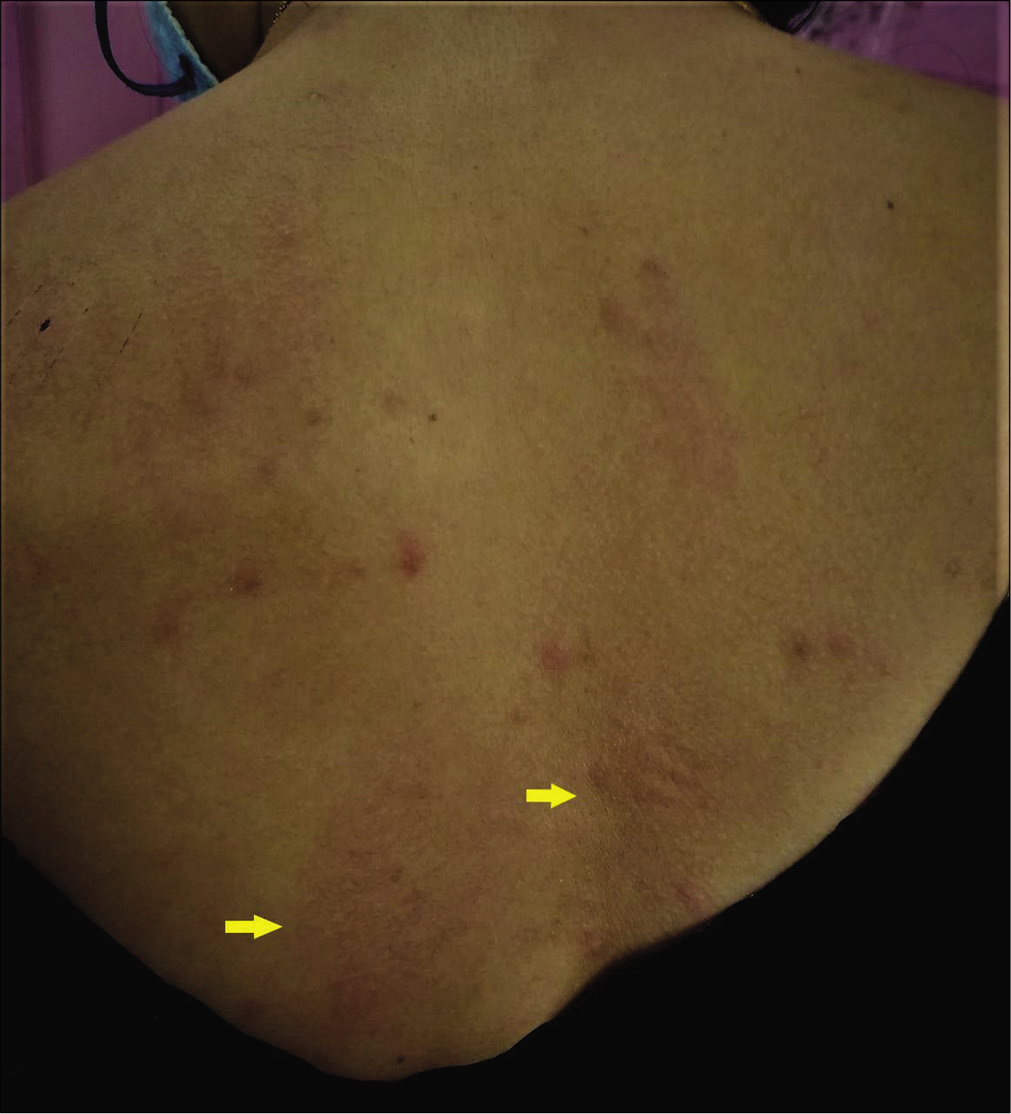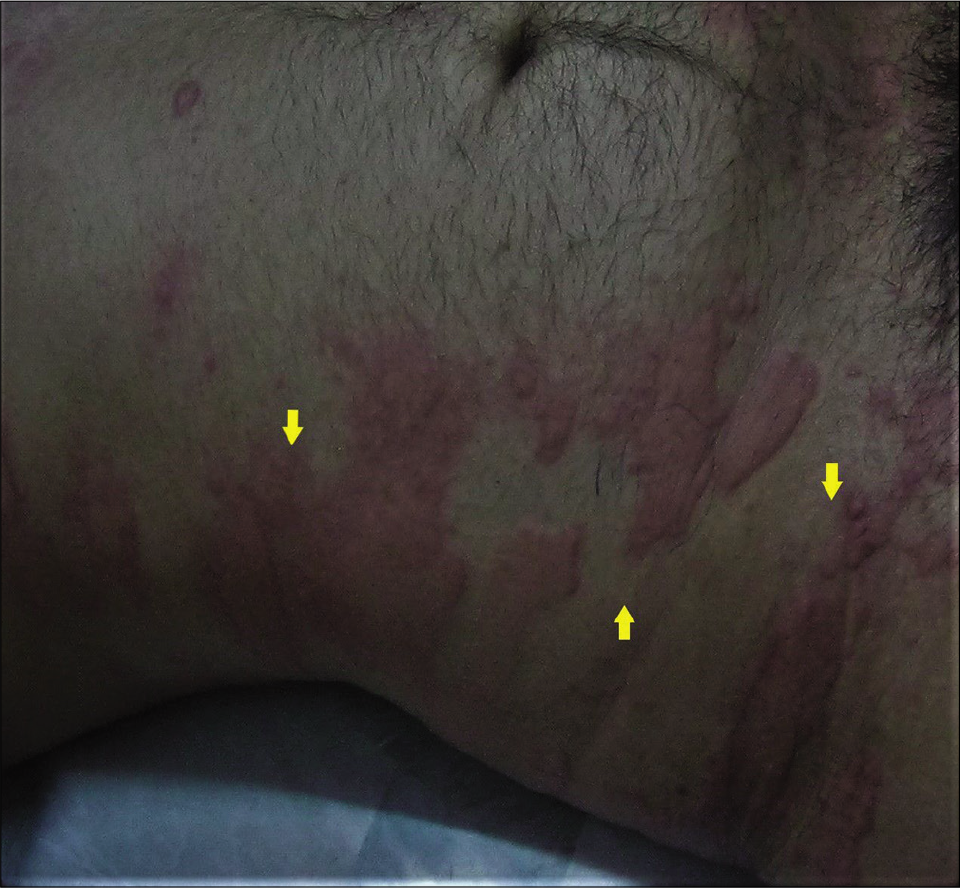Translate this page into:
Urticaria associated with COVID-19: A report of two patients and review of literature
*Corresponding author: Bhushan Jairam Telhure, Department of Dermatology, Dr Vasantrao Pawar Medical College, Nashik, Maharashtra, India. bhushan.telhure@gmail.com
-
Received: ,
Accepted: ,
How to cite this article: Zawar VP, Telhure BJ. Urticaria associated with COVID-19: A report of two patients and review of literature. Indian J Skin Allergy 2022;1:26-7.
Dear Sir,
Urticaria is one of the most common diseases to present in dermatological OPD. Various viral infections also manifest with urticarial rash.[1] With advent of the COVID-19 pandemic, the incidence of urticaria may have increased.[2] This article highlights the manifestation and association of urticaria with COVID-19.
CASE 1
A 42-year-old female presented with history of single episode of fever and loss of smell since 3 days. Her COVID RT-PCR swab was sent. On the 3rd day, she started complaining of intense itching along with appearance of wheals [Figure 1]. The wheals were transient in nature, not associated with drug intake. The patient had no history of atopic diathesis or similar lesions in the past. On 3rd day, patient was diagnosed with mild COVID-19 and then the patient was started on treatment. The cycle-threshold (CT) value of RT-PCR for this patient was 24 and her 25-point CT severity score was six. The urticaria activity score (UAS) for the patient was three. The patient was started on tablet Levocetirizine 5 mg twice daily along with calamine lotion twice a day. Patient reported good control in itching and wheals. The patient was discharged after 10 days and when followed up reported no urticarial activity.

- 42-years-old female presenting with fever, loss of smell and wheals along with itching with acute urticaria. Digital photograph showing wheals (yellow arrows) over the back.
CASE 2
A 28-year-old male presented with history of fever since 4 days and shortness of breath since 1 day. Patient complained of intense itching with appearance of wheals since 2 days [Figure 2]. Patient was diagnosed as moderate COVID-19 and admitted to the hospital and started on treatment. The CT value of RT-PCR for this patient was 18 and his 25-point CT severity score was 12. The wheals were transient in nature with intense itching, not associated with drug administration. There was no history suggestive of atopy or similar complaints in the past. The UAS was five. Patient was started on tablet hydroxyzine hydrochloride 25 mg twice a day along with calamine lotion twice a day. Patient reported good control of the lesions and itching. Patient was discharged after 21 days. After discharge, patient reported no activity 1 month later on follow-up.

- 28-years-old male presenting with fever, shortness of breath and wheals along with itching with acute urticaria. Digital photograph showing wheals (yellow arrows) over the chest and the abdomen on the right side.
COVID-19 is associated with various cutaneous features such as maculopapular rash, vesicular rash, urticaria, and chill-blain like lesions.[3] Cytokine storm is associated with release of multiple cytokines and chemokines example: IL-8 and INF-gamma which are known to be involved in pathophysiology of urticaria. Both of our patients had urticaria early in the disease course before starting the treatment of COVID-19 and both of them showed good clinical response to anti-histamines and did not report relapse following cure of COVID-19. To conclude, urticaria may be considered as a probable indicator in COVID-19.
Declaration of patient consent
Patient′s consent not required as patients identity is not disclosed or compromised.
Financial support and sponsorship
Nil.
Conflict of interest
There are no conflict of interest.
References
- Urticaria and infections. Allergy Asthma Clin Immunol. 2009;5:10.
- [CrossRef] [PubMed] [Google Scholar]
- Evaluation of urticaria patients before and during the period of the COVID-19 pandemic: A retrospective study. Dermatol Ther. 2021;34:e14800.
- [CrossRef] [PubMed] [Google Scholar]
- COVID-19(SARS-CoV-2) infection presenting as acute urticaria. Clin Dermatol. 2021;39:312-3.
- [CrossRef] [PubMed] [Google Scholar]





